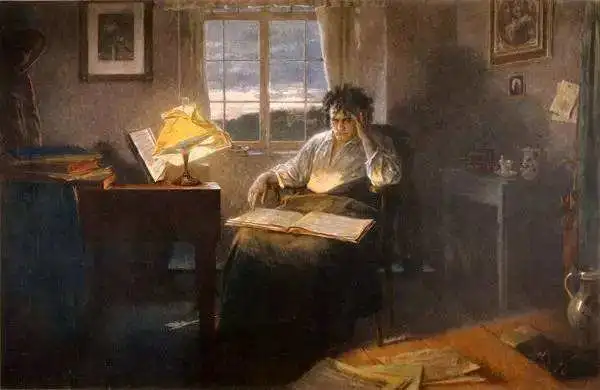
# 01
Beethoven was a musical giant who was the culmination of the classical music school and the pioneer of romanticism, and his late works after 1815 showed more distinctive characteristics in terms of melody, melody, variations, and religion. Wagner said that Beethoven in his later years was a god, but God was high above and did not belong to us in this rolling red dust.
It can be seen that his late music is more difficult to understand. In his later years, he was honored, but he was alone, and his love was frustrated and his family misfortune made him exhausted. Deaf in both ears, he retreats from the hustle and bustle of the outside world, can only communicate with people through pen talk, and his personality becomes moody and suspicious.
But the torture of the flesh and the misfortune of his personal life did not make his creativity decline, but on the contrary, it took on a new look, and Beethoven's last 10 years of creation became an independent style. And this independent style is precisely the artistic characteristic of Beethoven's late creation.
Beethoven's major works of this period are Symphony No. 9 (chorus), Diabelli Variations, Solemn Mass in D major, late string quartets (Op. 127, 130-132, 135) and the last five piano sonatas (Op. 101, 106, 109–111).
In these late works of Beethoven, the lyrical component was strengthened, and the music emphasized more on the self-expression of the individual, giving the work a distinct romantic tendency.
The potential of his themes and motivations was maximized; he abandoned the square musical structure and achieved musical continuity by not emphasizing the terminating formula and blurring it; his breakthroughs in classical style were more pronounced, such as changes in the number of movements, some works with only two movements (e.g., piano sonata, Op. 111), while others had many movements, such as the string quartet in ascending C minor (op. 131), which began with a soft version of the fugue, which had seven movements.
During his lifetime, Beethoven composed 32 sonatas of a "biographical nature". The last five are very different from the previous 27: musical introspection, full of reflection, language difficult, dense and dignified, basically indicating the direction of his late creation.
# 02
Piano Sonata in A-Flat Major Op.110, No. 31, was composed in 1821. By this time, Beethoven was completely deaf.
The style of the song is deep, deep and emotional, dignified, and at the same time full of contradictory opposites: pain and hope, clarity and haze, vacillation and determination. It contains the troubles, pains, worries, and despair that Beethoven experienced in his twilight years, as well as his difficult struggles to overcome all this suffering.
The Ninth Symphony (Chorus) premiered on May 7, 1824, and the all-deaf Beethoven could no longer hear the enthusiastic cheers of the audience after the premiere. The most striking innovation of this work is the use of choral and solo vocals in the final movement.
The choice of lyrics underscores two basic ideas that Beethoven adhered to throughout his life: human joy and universal brotherly love, and love for the eternal Father as a basis.
This conception led to the introduction of vocal music not only for the first time in the symphonic genre, but also to the formation of unusual forms, such as the use of large variations and double-themed fugues. At the beginning, Beethoven begins the vocal introduction with a paragraph of narration and responds with an orchestra. All this makes this symphony one of Beethoven's most original works.
Clips from the movie:
Symphony No. 9 (chorus): A fragment from the film Copy beethoven
- Dubbing -
Wang Bo
- Text -
Meng Genmiao
- Planning -
Wang Bo, Wang Feng, Zhou Wanlu, Li Zezhao, Xue Zexu
- Edit -
Zhang Xian, Pan Xian, Guo Zhoufan, Xu Junyi, Luo Limin
- Typography -
Lin Shengjie